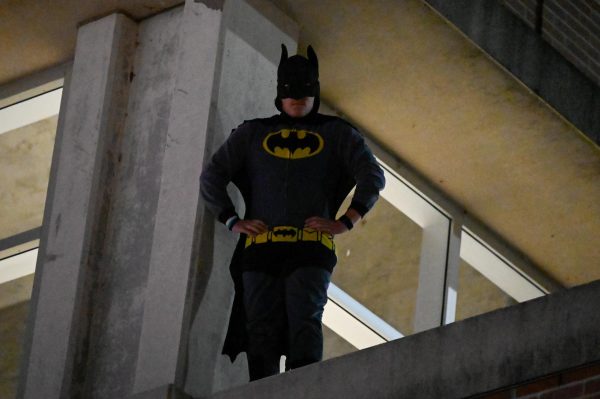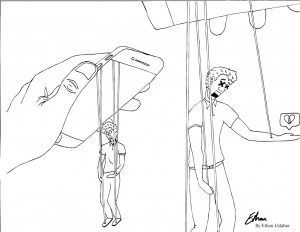Lack of UWO vaccination policy injects concern
A misguided public health concern over vaccinations has led to the quarantine of seven schools and two universities, a 300% increase in measles cases worldwide and the greatest number of measles cases in the U.S. since its elimination over 19 years ago.
The anti-vax movement has begun to make its mark in America.
On April 29, the Centers for Disease Control and Prevention announced more than 700 cases of measles in 22 states in the United States, the most significant re-emergence since the CDC announced measles elimination in the U.S. in 2000.
“We had all these diseases eliminated but now they’re coming back; I wonder why?” UWO English major Courtney Schuna said.
The CDC said more than 500 of the newly infected individuals were not vaccinated, which the CDC is linking to misinformation regarding the safety of vaccines.
UW Oshkosh advertising major Alexandra Goudy said she thinks measles came back because people stopped vaccinating.
“They think it’s harmful. They think introducing it into a baby’s blood system is going to cause autism,” she said.
The anti-vax movement bases this belief on a study published in 1998 that suggested the measles-mumps-rubella vaccine, or infection with the measles virus, could cause autism.
“All of a sudden everyone is against vaccinations,” Goudy said.
But research used in the 1998 study has been proven false and the study was retracted from the medical journal it was published in.
“There is no proof whatsoever that it causes autism in any sort of way,” Goudy said, “so why wouldn’t you vaccinate just to be safe? It’s not going to give your kid any kind of virus; it’s protecting against that.”
UWO public relations major Sara Sterk said people who choose not to vaccinate due to autism concerns “are saying they would rather have a dead kid than a kid with autism.”
As far as anti-vaxxers on the UWO campus, nursing major Lena Schuster said “there really aren’t many.”
UWO public relations and advertising major Lance Gulotta said anti-vaxxers need to consider the benefits of vaccines.
“There is so much history to back up why you should vaccinate and all the good it’s done and there’s not enough from the other side. There’s no concrete facts.”
Recent studies listed on the CDC website have shown no correlation between vaccinations or vaccination ingredients and autism.
Schuna, who has three siblings with autism, said autism is genetic.
“Vaccines don’t cause that,” she said.
The World Health Organization lists vaccine hesitancy as one of the top threats to global health in 2019.
Despite the risks, it is clear many parents are choosing not to vaccinate their children.
On April 29, The New York Times reported seven schools in the U.S. were quarantined, along with the University of California Los Angeles and California State University, due to the high number of students who were exposed to the measles virus.
UWO student health center office manager Sarah Anderson said she thinks vaccinations are a problem nationwide.
“As far as UW schools, there isn’t a blanket policy for vaccinations,” Anderson said.
UWO students are only required to provide proof of vaccination if they are going into the nursing program, which Sterk said concerns her.
“Think about the amount of tour groups we have on campus that are under 18,” she said. “There’s a childcare place on campus. We have events where the public can come in. Anyone can come onto campus and anyone could be a carrier.”
Lead University services program associate Sarah White provided a list of vaccinations that UWO nursing students are required to receive, including MMR, chicken pox, Tdap, influenza and a TB test. She said there are no exceptions to the vaccination policy.
Schuster said her mom didn’t believe in vaccinations, so when she enrolled in UWO’s nursing program, she had to get all her vaccinations at once.
“You just sit there like ‘keep going, keep going,’” she said. “But being a nursing student, you’re more susceptible to viruses.”
In UWO dorms, students are only required to affirm they have received meningococcal and hepatitis B vaccines.
Wisconsin is one of 18 states in the U.S. that allows a personal conviction exemption for vaccinations. Rep. Gordon Hintz of Oshkosh, along with a group of state lawmakers, have introduced a bill to eliminate this exemption.
The ongoing misinformation regarding vaccine safety, combined with the alarming increase in measles cases both in the U.S. and worldwide, illustrates the strong need for the UWO campus to update its immunization policies to require vaccinations for all students on campus.
“If it’s an outbreak type situation, something you could die from, then yeah, you should be vaccinated,” Goudy said.
Sterk agreed.
“You are putting everyone else in danger of getting sick with deadly diseases,” she said. “There’s a reason vaccinations work.”
Schuna said vaccinations should be mandatory at UWO and by law.
“It doesn’t matter your personal beliefs in the matter, as a country-wide thing for medical health, we should all be vaccinated,” Schuna said.
Gulotta said both children and adults need to be vaccinated.
“Just vax your kids, just vaccinate them,” he said. “I don’t like shots either; just give me the vax.”










